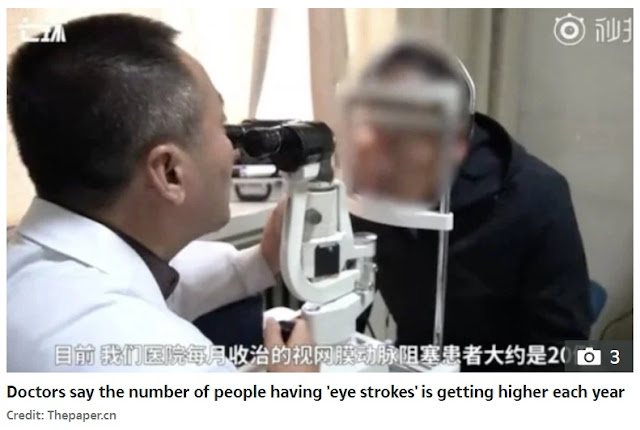Doctors are warning smartphone addicts not to use their phones in bed as it could trigger an “eye stroke”.
Medics have revealed staring at your electronic device in the dark can cause an eye clot which can result in severe vision loss if not treated immediately.
It comes after a man was “temporarily blinded” after constantly staring at his phone in the dark.
The patient, identified as Wang, from northwest China, momentarily lost his sight after playing games on his smartphone with the lights off.
“I was using my right eye to look at my phone, and I could see some words but not others,” he told South China Morning Post.
“I love playing on my phone, but at night my wife doesn’t want me using it because the screen light is too bright after the lights have been turned off,” he added.
Wang rushed to the doctors where they diagnosed him with a central retinal artery occlusion or also known as an “eye stroke”.
The condition is caused by a blockage of the arteries carrying oxygen to the retina, which sends signals to the brain.
Wang’s doctor, Lei Tao, said Wang’s temporarily blindness was caused by an “overuse of electronic items,” which can lead to “excessive strain on vision”.
Dr. Tao, who says he sees around 20 young sufferers of the condition every month, said that blockage of the arteries in the retina is sudden, serious and the primary manifestation of eye disease that leads to blindness.
“We commonly call it an eye stroke. The occurrence rate is getting higher each year, and there is a trend of younger victims,” he said.
Dr. Tao further said that the rate of permanent blindness is also high, which can seriously affect the patient’s quality of life and contribution to society.
Despite this, some medics are saying to take the report with a pinch of salt — as retinal artery occlusion usually only occurs in one percent of the population.
On the other hand, Dr. Gareth Lema told The New York Post that a far more likely culprit for causing Wang’s eye condition is “transient smartphone blindness”.
Smartphone blindness is a temporary loss of sight in one eye caused by constant phone use in low-light conditions.
A team of eye experts from Moorfields Eye Hospital and several London universities recently published an urgent warning about smartphone blindness in The New England Journal of Medicine.
They described the cases of two women who experienced temporary blindness in one eye.
“When the patients were seen in our clinic, detailed history taking revealed that symptoms occurred only after several minutes of viewing a smartphone screen, in the dark, while lying in bed (before going to sleep in the first case and after waking in the second,” the team wrote.
After scratching their heads about what was causing the problem, the doctors concluded that the eye peering a smartphone had become “light-adapted while the eye blocked by the pillow was becoming dark-adapted”.
“Subsequently, with both eyes uncovered in the dark, the light-adapted eye was perceived to be ‘blind’,” they said.
The condition is likely to become more and more common due to society’s addiction to smartphones.
“Although most people view screens binocularly [with two eyes], people frequently use smartphones while lying down, when one eye can be inadvertently covered,” they said.
The doctors added that smartphones are now used nearly around the clock, and manufacturers are producing screens with increased brightness to offset background ambient luminance and thereby allow easy reading.
You’ll know if you’re suffering from smartphone blindness if one eye suddenly appears to go ‘blind’ and you won’t be able to see properly out of this peeper or it may stop working altogether.
This generally happens when sufferers are lying in bed at night because of the vision from one of their eyes is blocked by the pillow.
The condition should sort itself out within about 15 minutes and if you’re blind for any longer, you should visit a doctor.
It’s important to seek medical attention immediately if you fear you are having a stroke because immediate intervention cuts the risk of suffering from serious complications.
Source: The Sun



 Doctors are warning smartphone addicts not to use their phones in bed as it could trigger an “eye stroke”.
Doctors are warning smartphone addicts not to use their phones in bed as it could trigger an “eye stroke”.



0 Comments